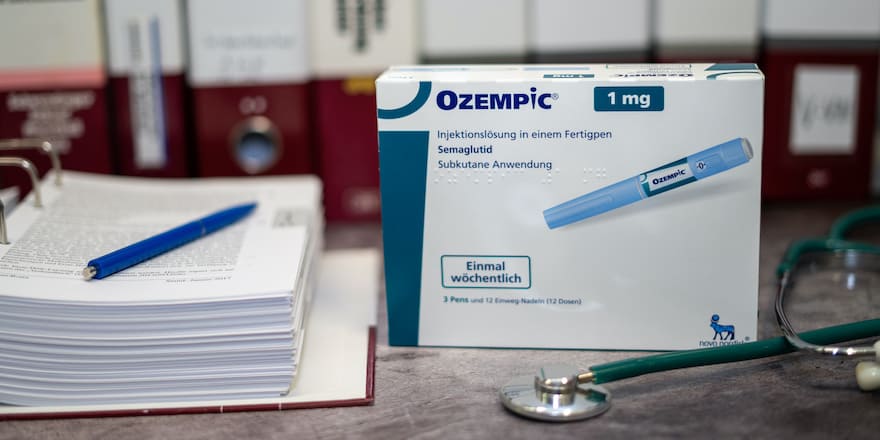Obesity affects 8 million people in France. It can be associated with an increased risk of diseases: diabetes, high blood pressure, heart diseases, strokes, certain types of cancer.
In consultation with my patients, as a dietitian, I notice that traditional approaches to weight loss, such as diet and physical exercise, are sometimes difficult to follow in the long term.
Some people turn to bariatric surgery, which modifies the anatomy of the digestive system. For others, the weight loss process remains very complicated and leads to frustrations, psychological disorders, and metabolic diseases.
Initially developed to treat diabetes, the drug Ozempic is making headlines today. Indeed, more and more people are using it to lose weight.
With the success of Ozempic, especially on social media, its original laboratory developed Wegovy. This new medication uses the same molecule, but this time targets obese individuals.
However, these medications remain controversial for their use in weight loss. The French National Agency for the Safety of Medicines specifies that Ozempic should only be used in the context of diabetes.
Read also | Criteria for choosing the best fat burner according to a pharmacist
What are Ozempic and Wegovy?
Ozempic and Wegovy are two drugs approved by the Food and Drug Administration and the European Medicines Agency for the treatment of obesity in adults.
Both contain the same active ingredient, semaglutide. This hormone acts on GLP-1 receptors in the brain to reduce appetite and increase the feeling of fullness.
They therefore have a appetite suppressant effect. And it is this effect that their consumers seek in the context of weight loss.
Marketed since 2018, Ozempic was created by the Danish laboratory Novo Nordisk for the treatment of type II diabetes. Indeed, semaglutide has significant effects on glycemic control and body weight regulation.
Seeing the beneficial effects on weight loss, the laboratory created another medication. Wegovy, with a higher dosage of semaglutide, targets individuals with obesity.
Ozempic and Wegovy are administered in the same way, as weekly injections.
What is their effectiveness on weight loss?
Miracle drug or marketing hype? The stakes are enormous for this type of medication. The introduction of drugs contributing to weight loss is highly anticipated by obese patients.
According to clinical trials, Ozempic and Wegovy have shown significant effectiveness in weight loss among obese or overweight patients.
They lose on average between 10% and 15% of their initial weight after 6 months of treatment with Ozempic or Wegovy.
These medications have shown particularly promising results for those who struggle to lose weight with diet and exercise.
Indeed, according to this study conducted on adolescents, reductions in body weight and improvements in cardiometabolic risk factors, such as waist circumference and levels of glycated hemoglobin and lipids, were greater with semaglutide-based drugs than with placebo.
After a year, 72% of adolescents had lost at least 5% of their weight.
According to the studies, the weight loss is real. But I must emphasize that the conditions for taking the medication are not always clear. Was the patient on a diet? Did they change their diet?
Semaglutide is not a miracle solution for weight loss. Its use should be accompanied by healthy lifestyle changes to achieve long-term results.

Dangers and side effects of these appetite suppressant drugs
Like any medication, Ozempic and Wegovy can pose a danger to some people. And cause side effects. The most common ones are nausea, vomiting, diarrhea, and headaches.
There are concerns about the effect of semaglutide on the pancreas, as it can lead to pancreatitis. Other side effects related to the risk of gallbladder disease such as cholelithiasis have been observed.
Moreover, semaglutide can also affect blood sugar and blood pressure. Patients with diabetes or high blood pressure should discuss with their doctor before taking these medications.
Pregnant or breastfeeding women should not consume it.
Although these side effects are rare, it is crucial for patients to monitor their symptoms.
A trend in the United States, many overweight or obese people purchase this medication. In France, between October 2021 and September 2022, 600,000 patients took a medication containing the molecule semaglutide and 215,000 patients received Ozempic for their diabetes.
Of these 600,000 people, the AMS estimates a potential misuse of Ozempic by 1%, with its use for something other than diabetes.
The risks of stock shortages in pharmacies may be anticipated depending on the trend in France. This could have a detrimental effect on diabetic patients taking Ozempic who may not find their treatment in the coming months.
Necessary Medical Follow-up
Do you wish to try Wegovy as part of weight loss? Initially, I advise you to schedule an appointment with your doctor to do a complete health assessment. Discuss with them the side effects, risks, and benefits of the treatment.
To access Wegovy, your doctor will need to submit your file either to an obesity specialist physician-nutritionist working in partnership with other professionals concerned with obesity, or to a specialized obesity center (CSO).
My Opinion on Ozempic and Wegovy for Weight Loss
Ozempic is a diabetes medication, so in my view, and as recently confirmed by the ANSM, it should never be used for weight loss.
Regarding Wegovy, developed for this specific purpose, certain conditions must be applied before requesting its use.
According to the HAS (French National Authority for Health), the patient must have an initial body mass index (BMI) ≥ 35 kg/m² and be under 65 years old. This medication can be prescribed in case of failure of a properly followed nutritional management (< 5% weight loss at six months).
As a dietitian, I would take a cautious approach to taking this medication. Indeed, we do not yet know the long-term effects. What about the possibility of regaining the weight lost? Will the weight be maintained once the injections are stopped?
Wegovy must be used in a very specific framework, with a multidisciplinary follow-up around the patient: nutrition, sport, psychology.



